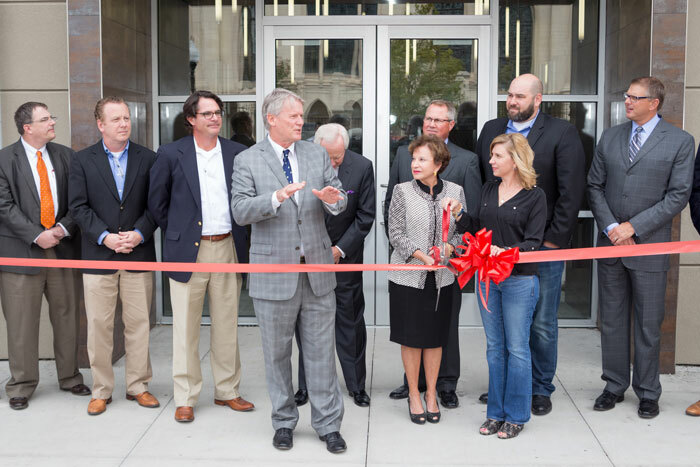
8:10 Building supports local mission and outreach
God has a unique way of taking the hopeless and transforming it for the joyful. A decade ago, a lifeless office building stood across 8th Street from First Church devoid of any future purpose. At least, that’s the way it may have seemed until someone realized we had an incredible opportunity literally at our doorstep. The vacant building was purchased by First Church, renewing its purpose to serve Tulsa in a transformational way. Fueled by God’s faithfulness and a congregation’s dedication to making a bigger impact on our community in the name of Christ, Project 8:10 (a reference to the building’s address and Nehemiah 8:10) came to life.
8:10 Origins
Peggy and Charlie Stephenson originated the idea for the 8:10 Building and provided generous support.
Here we are in the final weeks of 2021, with the building now entirely paid off and the focus on using proceeds from tenant leases for local mission and outreach. I had a chance to speak with Patrick Grogan (my dad), who happens to chair the 8:10 Project Council, about some of the exciting endeavors now underway.

Q: How are missions selected?
A: Two years ago, the Session established the 8:10 Project Council to be a clearinghouse of ideas for the use of the funds dedicated to local mission. Since then, the council makes recommendations to the Session who must give the ultimate approval. A charter compiled from the work of multiple committees over a five-year period serves as a guide for the council to help discern the appropriate mission opportunities.
First, the mission must point to the Good News of Jesus as the author and sustainer of life, encouraging all to taste and see that the Lord is good.
Importantly, we favor transformational projects that address root causes or systemic issues that affect our community in a negative way.
We prioritize missions with service engagement opportunities for First Church members with a goal toward long-term relationship building, especially projects that lean into the competencies and passions of our congregation.
There is also a focus on supporting a handful of major projects rather than many small ones.

Q: How have the funds from the 8:10 Building been used to serve our fellow Tulsans in the past year?
A: The funds have been used most notably in two ways. Masterwork Academy is a beautiful and effective example of the kind of mission that meets all the criteria for funding through the 8:10 Mission Fund.
Due to the pandemic, the 8:10 Mission Fund was also tapped to meet urgent short-term needs of our congregants and others in the community this last year.
Q: What is the importance of supporting transformational projects?
A: Transformation involves seeking change in the whole of human life materially, socially and spiritually, by recovering our true identity as human beings created in the image of God. It also means discovering our true vocation as productive stewards, faithfully caring for our world and each other. Transformational mission is by necessity relational. It is built upon the development of personal relationships and goes both ways. Not only is the one being served able to experience transformation, but we too are drawn closer and deeper into our relationship with God and others.
Relational missions by their very nature take time and human resources, and thus often are more costly to execute. This is why a generous pool of funds through the 8:10 Mission fund allows us to delve into missions that we might not otherwise be able to fund.
Q: How can mission ideas or recommendations for funding be brought to the 8:10 Project Council?
A: Any idea for mission opportunities or requests for funding can be placed before the 8:10 Project Council via a brief written application that is available from the Church office.
The 8:10 Project Council team covets your prayers that the Holy Spirit will direct us and the Session as we discern how best to strengthen the Kingdom of God in Tulsa for His Glory.
To learn more about the 8:10 Mission Project, visit FirstChurchTulsa.org/serve/local.